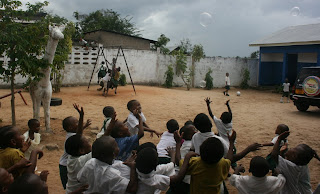Here in Dar, the transportation system is pretty interesting. The first thing is the roads. The downtown road system is all paved, but thats about it, except for major highways. The rest of the road system is all dirt, and ranges from tolerable to oh-my-god-i-think-im-going-to-die. In terms of traffic laws, they're more of "unwritten rules" rather than actual laws. Private cars and public buses alike drive on whatever side of the road they want, even into oncoming traffic, if its to their advantage. I spend the majority of my time holding my breath with Sampson, our driver (by "our" driver, I mean that he works for the clinic, delivers samples to and from the hospital, and occasionally gives us a ride). He's an ex-taxi and ex-bus driver. The street we live on is big and has wide sidewalks. Wide enough for a car, even? Why yes, and thats why we scramble off the sidewalk to make way for a taxi thats trying to make better time by avoiding the lame "actually driving on the road" traffic.
 Sampson and his sweet ride
Sampson and his sweet ride
In terms of variety, there are basically 4 different ways you can get around. The first is in your own private car. Sweet, especially when half of them around here are land cruisers and defenders, so you look like a total badass while you comfortably transport yourself. The second are taxis. This is an interesting choice, as its expensive for what you actually get. If you want to go to a landmark of some sort, cool. You're good to go, cause taxi drivers know landmarks. A street though? or an intersection? Not so fast. It seems that most people, not just taxi drivers, have little knowledge of actual road names. The other day, I was looking for a street named Uhuru and wasn't sure quite where it was. I asked a woman. "Uhuru? Hmmmm, haven't heard of it." She turned to her friend, who replied, "No, I don't think theres an Uhuru around here." So as a ditch effort, I asked one last guy around. "Uhuru? Yeah, you're on it right now." Here, its all about neighborhoods and bus stops.
A third way to get around is by walking. While this is great for seeing all kinds of awesome stuff and really experiencing the vibrancy of the city life, Dar also gets exponentially dangerous as the sun descends. By the time seven o'clock rolls around, having white skin is akin to wearing a huge billboard that says "ROB ME! I'M CONFUSED, UNARMED, AND PROBABLY CARRYING TOO MUCH CASH. "
So that leaves the public transportation system. This is how I get to work every day, and pretty much to anywhere when I'm not riding with someone who has a car. Buses here are called "Dala Dalas," and are a privately owned but government-regulated series of minibuses. Theres no specific dala dala map-system, so things seem completely hectic and unorganized at first, but after a while you start to get the hang of the names of places and where buses go, and things start to make sense.
The funny thing, though, is how they pack them. Theres absolutely no rules whatsoever as to how many people can be in a single vehicle, so dala dala drivers make it their business to try to fill every square inch of space with human. On a bus that properly seats about 12 people, anywhere from 25-30 people might be shoved in on a busy route. And the guy who collects the money from people is insanely talented at convincing you to get on the bus. Multiple times, we've looked at a bus, said "there is no way another human being could possibly fit into that thing," and Money Guy somehow goads us on in. Theres a joke that people are stacked vertically in dala dalas during rush hour, cause everyone climbs in through the windows.
 A typical dala dala
A typical dala dala
Twice now, I've been on buses that have just straight broken down. Its almost more awkward than sad, because I guess theres and understanding that no one has to pay fare if it breaks down, so Driver and Money Guy are using every trick in the book to try to get 'Ole Bessie to come back to life. Money Guy is pushing the back and Driver is screaming audibles but nothing is happening. Everyone on the bus is just waiting for them to give up the ghost, and when they finally do, everyone kinda tip-toes off and pretends nothing happened.
The best part of the dala dalas is the decoration, though. The name of the bus is usually written on the back-- the old favorites are G UNIT and various European soccer teams (sometimes there will be competing teams on the front and back), and Wellcome. My favorite thus far has been "TRUST ME." Other noteable design flairs are the interior framed picture of the exterior of the bus (to avoid confusion, I guess) and the omnipresent sticker "This car is protected by the blood of Jesus" where "blood" is written in red drippy font.
I wish I had more pictures to show you, but safety is an issue on dala dalas as well. One of my friends here has already had his phone stolen out of his bag when boarding, and another barely held onto hers when someone reached in a window for it from outside. I've yet to experience it, but people say that thieves will prick your hand with a pin to elicit you to draw your hand out (with cellphone) in pain, and then snatch it from you. So no cameras is my general protocol.
And now, a few pictures of random things that don't get an entire passage:
 Efficiency is key
Efficiency is key
 All scaffolding here looks like this
All scaffolding here looks like this
 The label makes me so happy
The label makes me so happy




























